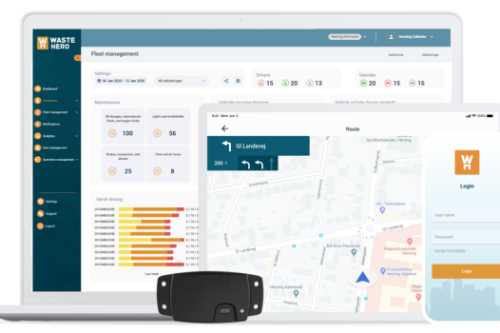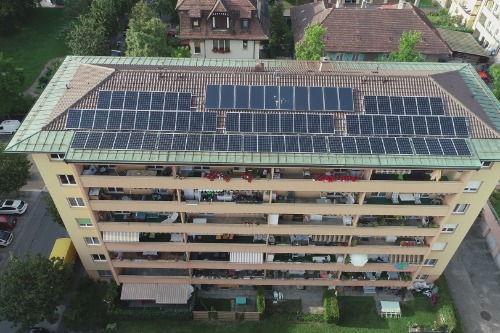Solutions for smart cities
How to shape the future of cities?
Discover more about the prospects of smart cities, the potential solutions to achieve sustainable urbanization and how you can contribute.

According to projections, nearly 70% of the world population will live in urban areas by 2050. While some megacities are already struggling to cope with the current inflow of people, we need to create smart cities in order to make these urban areas more liveable and truly sustainable.
What is the definition of a smart city? What are the benefits and challenges? And finally, what are the smart solutions to urbanization?
01. Solutions
Solutions for smart cities
The Solar Impulse Label is granted to innovative solutions to urban problems that meet high standards of sustainability and profitability.
Each solution goes through a strict assessment process performed by independent experts.

02. Definition
What is a smart city?
A smart city is an urban development using Information and Communication Technology (ICT) and Internet of Things (IoT) to provide useful information to effectively manage resources and assets. This includes data collected from citizens and mechanical devices, that are processed and analyzed to monitor and manage traffic and transport systems, power plants, water supply networks, waste disposal, etc.
Also called eco-city or sustainable city, the smart city aims to improve the quality of urban services or reduce its costs. It stands out for its specificities: smart management, lifestyle, mobility, housing, as well as a smart economy. Their main goal is to reconcile technological innovation with the economic, social and ecological challenges of the city of tomorrow. Their leitmotiv is the quality of life: how to live better together while respecting our environment.
03. Examples
Examples of Smart Cities
Some cities are leading the way in urban sustainability. But which smart city initiatives are the most advanced?

04. Benefits
Benefits of smart cities
Smart cities and technologies have many practical and economic benefits:

1. Environmental impact
Reducing the CO2 footprint is the main driver behind the development of smart and sustainable cities. Improving energy efficiency and storage, waste management, traffic conditions are among the greatest advantages.
2. Optimized energy & water management
Smart grids and smart water management are recurring themes of smart cities. Energy consumption and potable water monitoring ensure the availability of energy and the quality of tap water across the city.
3. Transportation
Clean and efficient transportation of goods, services and people is essential. In the hope of optimizing mobility, many cities are turning to smart technologies to ease traffic congestion and provide users with real-time updates.
4. Security
Safety is a priority for all cities. The accelerated development of smart cities should allow municipalities to better monitor their citizens thanks to CCTV cameras with facial recognition. In addition, state-of-the-art CCTV cameras are also equipped with motion and smoke detectors, as well as fire alarms.
05. Challenges
Smart citie challenges
However, these benefits come with a series of risks:

Infrastructure and costs
Smart cities use sensor technology to gather and analyse information such as rush hour stats, air quality or crime rates. The implementation of these sensors requires a sophisticated and costly infrastructure.

Security and privacy concerns
Even though security is part of the benefits, it can also be regarded as a challenge as the use of IoT and sensor technology increases. In fact, the threat of cyber attacks is a critical issue for smart cities. Also, to avoid concerns about data use, smart cities need to involve their citizens. Awareness, education, and transparency on the purpose of data collection are crucial to make the community feel that they are truly taking part in making their city more sustainable.

Social risks
Inclusive urbanization must be a priority to deal with the increasing vulnerability of poor and slum populations. That is why we need to ensure that no population is excluded from smart city data collection and use.

06. Technologies
Smart cities technologies
Sustainable solutions to urban problems imply smart city developments like:

1. Smart buildings
The optimisation of services like heating, ventilation, and air conditioning (HVAC), as well as energy usage and efficiency, is crucial. Building-integrated photovoltaics are a great solution of smart building management.

2. Smart mobility
Promoting electric vehicles, self-service bikes, public transport and carpooling networks, as well as providing charging stations must be a priority, to give city dwellers true sustainable alternatives to the single-occupant fossil fuelled car.

3. Smart lighting
Lighting optimization aims at reducing energy usage of the lighting systems, by providing the correct amount of light at the correct time with efficient fixtures. Intelligent and weather adaptive streetlights are a good example of smart lighting systems.

4. Smart roads
Control sensors can be used to monitor certain traffic patterns and common traffic jams. Besides, smart technologies can detect the possible deterioration of equipment such as traffic lights and light panels for pedestrians, or the effect of traffic on the environment.

A challenge, #1000 Solutionsto change the world

A label focused on both the environment and profitability.
For the first time a label proves the economic profitability of solutions that protect the environment. The Solar Impulse Foundation is selecting 1,000 solutions that protect the environment in a profitable way and awarding them the Solar Impulse Efficient Solutions Label.
Collaborating with independent experts and with renowned institutions, the World Alliance proposes to evaluate its members solutions free of charge. The Solar Impulse Efficient Solutions label will offer a competitive edge to innovators and a guarantee of quality to solution seekers.

A label focused on both the environment and profitability.





































